Stephen Morris's Blog, page 4
February 28, 2023
Serious Joy
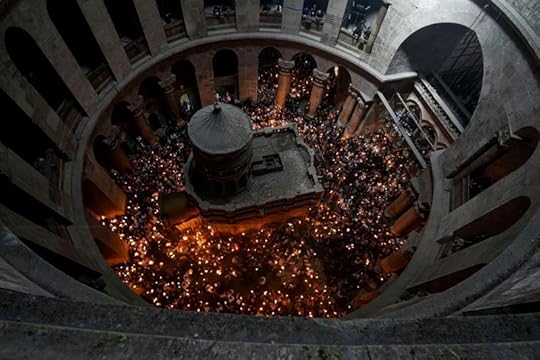
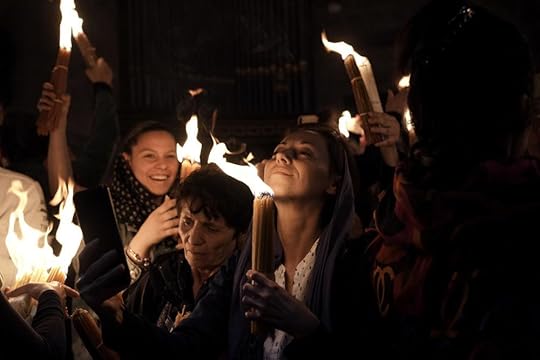
 Christian pilgrims hold candles on Easter Eve as they gather during the ceremony of the Holy Fire at Church of the Holy Sepulchre, where many Christians believe Jesus was crucified, buried and rose from the dead, in the Old City of Jerusalem dead, Saturday, April 23, 2022. (AP Photos/ Tsafrir Abayov and Maya Alleruzzo)
Christian pilgrims hold candles on Easter Eve as they gather during the ceremony of the Holy Fire at Church of the Holy Sepulchre, where many Christians believe Jesus was crucified, buried and rose from the dead, in the Old City of Jerusalem dead, Saturday, April 23, 2022. (AP Photos/ Tsafrir Abayov and Maya Alleruzzo) For the love of Christ holds us in its grip, since we have reached the conclusion that one has died for all; therefore, all have died and he died for all in order that those who live might live no longer for themselves but for him who died and was raised for them…. if anyone is in Christ, that person is a new creation; the old has passed away; behold, the new has come. (2 Cor. 5:14-17)
One man died for all and rose from the dead. Christ. Because that one man died, everyone has died. Because that one man rose, everyone will rise. Because everyone will rise, no one lives only for themselves. No one has to be afraid of everybody else. No one has to protect themselves from everybody else. No one needs to live only for themselves, looking out for Number One and taking and taking and taking from other people in order to survive themselves. Because everyone has died and will rise again, we are free to live without fear. We are free to live for those around us.
The human race died when Christ died on the Cross. The human race rose with Christ from the tomb. Now it is for each of us to personally accept that we have died and will rise again when our bodies catch up with the spiritual reality that already exists. Baptism, as St. Nicholas Cabasilas wrote in the 14th century, is our joyful acceptance of that immortality that awaits us. There’s no way to avoid that resurrection and immortality. We can either be happy about it or we can be miserable about it. We are washed in Holy Baptism and accept the reality that we cannot escape: we will be with Christ forever. The misery of being with someone forever when we don’t want to be there is what we call Hell.
Dead and risen with Christ–joyfully accepting the death and resurrection that we cannot escape–means that we are new people, a new creation. The old me died in the font. The new me emerged dripping wet, with one foot already in eternity–“the time beyond time,” we might say.
I am a new creation. I am free to live for those around me. I can be Dorothy Day, if I want. I can be Mother Theresa, if I want. I can be Gandhi, if I want. I can pour myself out in love for the people in my neighborhood, wherever that neighborhood happens to be. I only need to take my coming resurrection seriously. Seriously, but joyfully.
Read more of what St. Nicholas Cabasilas wrote about Holy Baptism in his masterpiece, The Life in Christ.
The post Serious Joy appeared first on Stephen Morris, author.
February 21, 2023
Tribulations … Small Time and Big Time
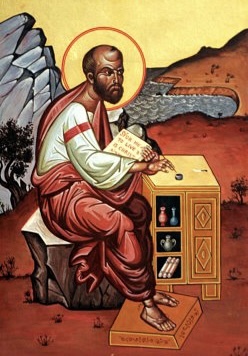 St. Paul writes one of his letters in this icon. He sits at a writing desk with plenty of writing supplies with his feet on a small pedestal. This is not a footrest. It is common in icons for saints to be slightly elevated by standing on such a pedestal to indicate that they are in a slightly higher position than we are, closer to God, and able to see the world more clearly, more honestly and truthfully. They are “on the heights” (Ps. 18:33). They are where we aim to be when we lift up our hearts.
St. Paul writes one of his letters in this icon. He sits at a writing desk with plenty of writing supplies with his feet on a small pedestal. This is not a footrest. It is common in icons for saints to be slightly elevated by standing on such a pedestal to indicate that they are in a slightly higher position than we are, closer to God, and able to see the world more clearly, more honestly and truthfully. They are “on the heights” (Ps. 18:33). They are where we aim to be when we lift up our hearts.Even though our outer self is wasting away, our inner self is being renewed day by day. For the momentary light weight of our tribulation is producing a more and more exceeding and eternal weight of glory over us who are not looking to what is seen but to what is unseen; for what is seen is transitory, but what is unseen is eternal. (2 Cor. 4:16-18)
St. Paul says that although he is physically tormented and wasting away, his inner self–his spirit, his soul–is being renewed and grows stronger every day. His tribulations attack him and damage his body but he is looking forward to the glory that he will share in the Kingdom of God.
All this was true for St. Paul. What about us? We are not being attacked for our faith and tormented physically the way St. Paul was. Why do we still read this passage today? What does it have to say to us?
Not all our tribulations are caused by our mortal, political or social enemies. Sometimes our tribulations are caused by our one True Enemy, which is Death. Some people might say that the Devil is our true enemy but the Devil–the great archetype of Evil, the gigantic monster with horns and bat wings that presides over Walpurgis Night in A Night on Bald Mountain–is actually more a comic figure than a frightful, terrifying figure. In all the stories of the desert fathers and mothers, the Devil is the comic relief: he is foolish and easily duped. He is a vain narcissist and the best way to get rid of him is to laugh at him.
The idea that the Devil is an exaggerated figure of terror comes to us from the Puritans who reduced the invisible world to simply God and the Devil. The Puritans forgot that the one, true, ultimate enemy of the human race–and of the whole created order–is, in fact, Death itself (1 Cor. 15). Death is The Enemy that Christ mounts the Cross to wage war against. Death is The Enemy that is destroyed from the inside-out by Christ’s Death and Resurrection. If we think the Devil is the enemy, then Christ’s Resurrection becomes less the salvation of the world and more a spectacular feat without much direct meaning for us.
Sometimes we bring tribulations upon ourselves. We do something stupid and suffer the consequences. But sometimes we embrace tribulations in order to teach ourselves a lesson. That’s one of the aspects of Lent: we embrace things that are physically difficult–fasting, longer prayers or Bible reading, putting up with people who are difficult–in order to experience a little bit of Christ’s victory over Death here and now.
The renewal of the human race, begun in the sacred bath of baptism, proceeds gradually and is accomplished more quickly in some people and more slowly in others. But many are making progress toward the new life …. No one starts out perfect. To think we can be perfect without a struggle against our fallen selves is a mistake. Thinking we can be perfect without a struggle is to lead the weary astray rather than uplift the weak. Is that really what you want to do?
paraphrase of St. Augustine’s The Way of Life of the Catholic Church I.35.80
God is not a sadist. He does not want us to be miserable. But sometimes we need a little reminder that the victory was won and is being played out and extended throughout the world bit by bit. We need a physical reminder of this and so we embrace small tribulations during the tithe of the year that is Lent.
The post Tribulations … Small Time and Big Time appeared first on Stephen Morris, author.
February 14, 2023
I Believed and so I Spoke
 This medieval illumination depicts Jephthah sacrificing his daughter after she spends time alone with her friends in the mountains “bewailing her virginity,” described in Judges 11. There was a festival of Jephthah’s daughter every year at midwinter; Christians see her as a “type,” a prophetic anticipation, of Christ.
This medieval illumination depicts Jephthah sacrificing his daughter after she spends time alone with her friends in the mountains “bewailing her virginity,” described in Judges 11. There was a festival of Jephthah’s daughter every year at midwinter; Christians see her as a “type,” a prophetic anticipation, of Christ.However, since we have the same spirit of faith according to what is written, “I believed, there I spoke out” (Ps. 116:9), we too believe; therefore, also speak out, for we know that the one who raised the Lord Jesus will raise us also with Jesus and place us together with you in his presence. (2 Cor. 4:13-14)
The Apostle Paul quotes the psalm: I believed, and so I spoke out. He points out that he–and the Christians faithful to his preaching–have the same faith as King David and Moses, who also faced great tribulations and adversaries from those they thought were their friends and followers.
The psalm that St. Paul quotes is commonly used in the Prayers Before Receiving Holy Communion. Because the Lord has delivered the psalmist, the psalmist asks, “How shall I repay the Lord for all the good things he has done for me?” The answer is: “I will lift up the cup of salvation and call upon the Name of the Lord.” and “I will offer you the sacrifice of thanksgiving [eucharist] and call upon the Name of the Lord.” God has delivered us and so we thank him by offering him a thank-offering and sharing a feast with him. We participate in Christ’s resurrection every time we offer the thank-offering and lift up the cup of salvation. But our lives have to match our liturgical actions.
He who raised Jesus from the dead will raise us also if we do his will and walk in his commandments and love the things which he loved, abstaining from all unrighteousness, covetousness, love of money, evil speaking, and false witness.
St. Polycarp of Smyrna, Epistle to the Philippians
St. Paul’s faith, and the faith of David, Moses, and all the prophets is placed in the same Lord. This same Lord delivered the prophets in the Old Testament and will deliver St. Paul and the New Testament believers as well. This deliverance is not simply victory over earthly enemies; it is victory over THE enemy, which is Death.
Paul believed that through the work of Christ, he and all believers were made greater than death and that they would all be brought before the terrible seat of judgement.
St. Theodoret of Cyr, Commentary on 2nd Corinthians
This psalm promises that “precious in the sight of the Lord is the death of his saints.” This verse was often associated with Jephthah’s daughter, who was sacrificed by her father to keep a promise he had made to God and which is similar in many ways to Abraham’s sacrifice of Isaac. (Read about Jephthah and his daughter here.) In both episodes, the father is asked to give a child as an offering to save a family or clan, anticipating our Father in heaven giving his own Son to be killed as a sacrifice that saves the world.
I highly recommend reading Psalm 116:9-end each week as part of our preparation for receiving Holy Communion. The words of King David become our words as well and together we lift up the cup of salvation to celebrate the victory which the Lord shares with us.
The post I Believed and so I Spoke appeared first on Stephen Morris, author.
February 6, 2023
Let Light Shine
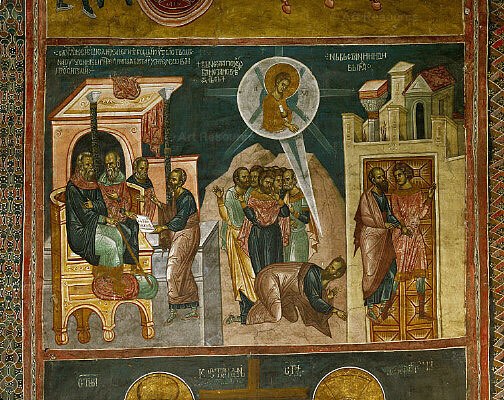
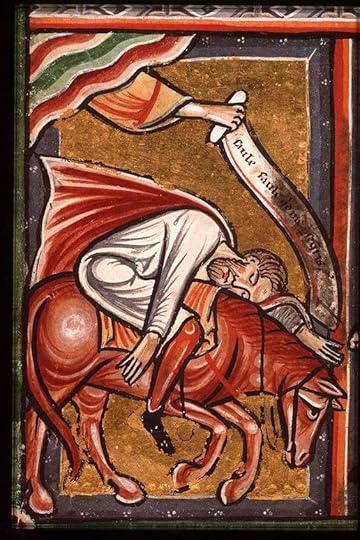
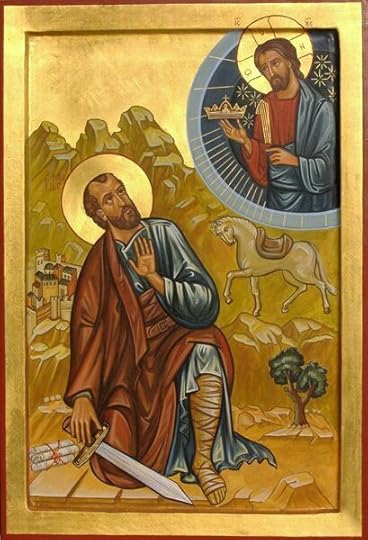 Depictions of St. Paul’s conversion on the road to Damascus, blinded by the divine light of Christ who spoke to him as he was going to arrest Christians for execution in Jerusalem.
Depictions of St. Paul’s conversion on the road to Damascus, blinded by the divine light of Christ who spoke to him as he was going to arrest Christians for execution in Jerusalem.On the contrary, we have renounced the deeds one hides for shame; we do not practice cunning or falsify the word of God, but through the open preaching of the truth we commend ourselves to anyone’s conscience in the sight of God…. it is the same God who said, “Let light shine out of darkness,” who has caused his light to shine in our hearts to spread the light of the knowledge of God’s glory in the face of Jesus Christ. (2 Cor. 4:2, 5-6)
St. Paul was accused by his enemies in Corinth of “cunning” financial business; i.e., they accused him of shady and dishonest business deals with church money. They also accused him of “cunning” ways to read the Bible that were also shady and dishonest. He tells them that he has not been involved in any “cunning” behavior–not with money and not with reading the Bible. His interpretation of Scripture is open and honest and available to anyone with an honest, open conscience.
St. Paul alludes to Genesis 1 (“Let there be light”) when he paraphrases the Father’s command, “Let light shine out of darkness.” He might also be paraphrasing the prophet Isaiah: “O people walking in darkness, behold a great light: you that dwell in the land and shadow of death, a light shall shine upon you.” (Is. 9:2) St. Paul is saying that the same light that overcame the darkness in the beginning of the world and at the destruction of Death has shone in his heart-mind and shines in the hearts-minds of all honest people.
The light of God that shines in St. Paul and in honest people reveals the truth of the Gospel. (Remember the light that shone on St. Paul at his conversion? It struck him blind in order to heal his heart, St. Augustine said.) People “see” the brightness of the Gospel and then personally adopt it and are transformed by it; they are transformed into the image of the glorious Christ and communicate it to others who are “illuminated.” (One ancient way to refer to baptism is to call it “illumination.” Old prayers for those about to be baptized asl God to bless “those preparing for holy illumination.”)
But our actual daily experience is not bright and glorious. We are wasting away and eventually die. Yet what is strong already manifests itself in what is weak and the future erupts into the present. The eternal breaks into the perishable and enlightens what is temporary and transient.
Knowing Christ as the true light, inaccessible to falsehood, we learn this, namely, that it is necessary for us to be illuminated by the rays of the true light. But virtues are the rays of the Sun of Justice streaming forth for our illumination, through which we lay aside the works of darkness and walk becomingly as in the day and we renounce those things which shame conceals. By doing all things in the light, we become the light itself so that it shines before others which is the unique quality of light. If we recognize Christ as sanctification, in whom every action is steadfast and pure, let us prove by our actions that we ourselves stand apart, being ourselves true sharers of his name, our deeds–not just our words–coinciding with his power of sanctification.
St. Gregory of Nyssa, On Perfection
The post Let Light Shine appeared first on Stephen Morris, author.
January 30, 2023
From Glory to Glory
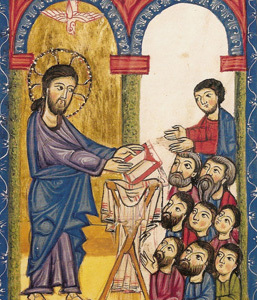 Jesus reads from the prophet Isaiah in the Old Testament and begins to preach (Luke 4). Illumination in the Gladzor Gospels, a manuscript from Armenia AD 1300-1307.
Jesus reads from the prophet Isaiah in the Old Testament and begins to preach (Luke 4). Illumination in the Gladzor Gospels, a manuscript from Armenia AD 1300-1307.Indeed, until today, whenever Moses is read, a veil lies on their heart. However, when one turns to the Lord the veil is taken away. Now the Lord is the Spirit; and where the Lord’s Spirit is, there is freedom. But all of us, with uncovered face beholding the glory of the Lord as in a mirror, are being transformed into the same image from glory to glory, as this comes from the Spirit of the Lord. (2 Cor. 3:12-18)
St. Paul tells us that a veil lies on the hearts of those who read the Old Testament without understanding that it speaks to us about Christ and points to Christ. Only by reading it in the light of Christ’s birth and life, his Death and Resurrection does the Old Testament tell us everything that God intends us to hear. Reading the Old Testament through the prism of the Gospel removes the veil from our hearts so that we can begin to grasp the full message of the words. In the Old Testament, we don’t see Christ directly but we see him reflected, “as in a mirror.”
We have to remember that a mirror in St. Paul’s day were not the silver-backed pieces of glass that clearly show us our own faces. In St. Paul’s time, a mirror was a polished piece of metal that reflected an image but the reflection was fuzzy and hazy. Sometimes it was hard for a person to really understand what they were looking at. So it is with Christ in the Old Testament: sometimes it his reflection is fuzzy and hazy. Sometimes it is hard for us to understand how we can see him in a particular Old Testament passage.
Reading the Old Testament from the perspective of the Gospel, we stand before God with naked faces–no veils!–and behold the glory of God that made Moses cover his face so that the people could look at him. Because we see the glory of God, we are being transformed into that same glory. We are always progressing from our current glorious state to an even more glorious state-of-being, suffused and saturated by the glory of God. Christian life is never-ending growth, becoming more and more like God. (When Adam and Eve were expelled from Eden, they lost their “likeness” with God but not the “image of God” in which they were made. It is the choice of each of us to recapture that “likeness.”)
The phrase “from glory to glory” is especially associated with St. Gregory of Nyssa nowadays because of the famous collection of his writings published under that title. (See it on Amazon here.) St. Gregory wrote:
Change is nothing to be afraid of. We are always changing. What is bad is if we are not changing for the better …. For this truly is perfection: never to stop growing toward what is better and never placing any limit on perfection.
Lent is coming. Lent is the time when the Church asks us to spend more time reading the Bible, including the Old Testament. In the early centuries of the Church, people coming to be baptized would be taught about Genesis, Proverbs, Isaiah in the Old Testament and the Gospel According to St. Mark and the Epistle to the Hebrews in the New Testament. (One of St. Gregory’s own, most important works is a collection of sermons on the Song of Songs in the Old Testament.) Most of the attention of the catechists (teachers) and catechumens (people wanting to be baptized) would be focused on the Old Testament. This might surprise most people today but should guide us in how much effort we put into reading which portions of the Bible.
The post From Glory to Glory appeared first on Stephen Morris, author.
January 23, 2023
Moses’ Shining Face
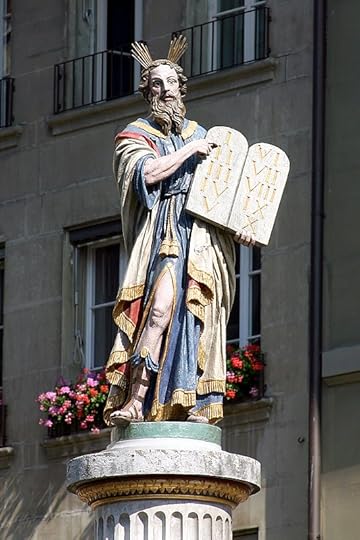 The Moses Fountain in the Old City of Bern, Switzerland shows Moses with rays of light. But it was common to depict Moses with horns because in Latin, the word for “rays of light” is only one or two letters different from the word for “horns” so the Latin text of Exodus read, “Horns came from Moses’ face” rather than “Rays of light came from Moses’ face.” Whether the original translation was mistaken, or copyists simply made a mistake that got repeated, the result was the same: Moses was usually depicted in Western Christian art with horns.
The Moses Fountain in the Old City of Bern, Switzerland shows Moses with rays of light. But it was common to depict Moses with horns because in Latin, the word for “rays of light” is only one or two letters different from the word for “horns” so the Latin text of Exodus read, “Horns came from Moses’ face” rather than “Rays of light came from Moses’ face.” Whether the original translation was mistaken, or copyists simply made a mistake that got repeated, the result was the same: Moses was usually depicted in Western Christian art with horns.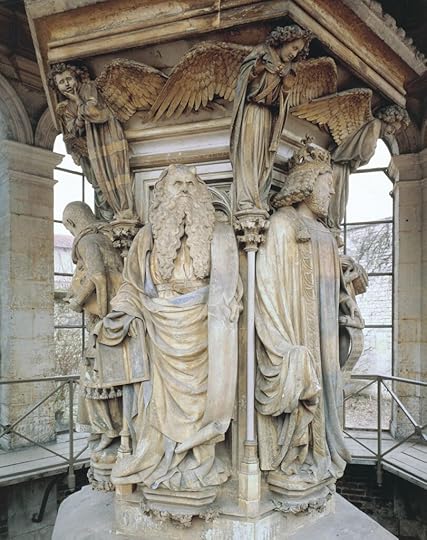 The Well of Moses by Claus Sluter (a Dutch sculptor) portrays Moses with two small horns outside a monastery in Dijon. The sculpture was carved in 1395–1403.
The Well of Moses by Claus Sluter (a Dutch sculptor) portrays Moses with two small horns outside a monastery in Dijon. The sculpture was carved in 1395–1403.If the ministry of death, carved with letters on stone, came into being with glory, so much so that the Israelites could not gaze at Moses’ face because of the glory of his face which was vanishing, surely the ministry of the Spirit will be even more glorious. For if glory belongs to the ministry of condemnation, surely the ministry of righteousness abounds with even more glory! (2 Cor. 3:7-9)
St. Paul is referring to the story in Exodus about Moses and the Ten Commandments. According to the Old Testament, Moses spent 40 days atop Mt. Sinai while God carved the Ten Commandments on tablets of stone. The mountaintop was hidden by thick clouds and lightning; none of the people down below could see what was happening. When Moses finally came down the mountain with the stone tablets, no one could look at him because his face was so bright. He had spent time in the presence of God and God’s glory had saturated Moses’ skin. Moses had to cover his face if the people were to be able to look at him. Eventually, the glory began to fade but …. Anytime Moses went into the Tent of Meeting to speak with God, the same thing happened: the glory of God saturated Moses’ flesh and he had to cover his face when he came out because his skin was so bright no one could look at him.
St. Paul says that if the commandments which God revealed on Mt. Sinai and throughout the time of Israel wandering in the wilderness–which had dire punishments attached to them all and only taught people what they could NOT do and condemned them because it was impossible to keep all the commandments–then the commandments of the New Testament and the gift of the Spirit (which makes the people righteous, not condemned) must be even more glorious. (Hebrews 10 points out, “A man who violated the law of Moses dies without mercy at the testimony of two or three witnesses.”)
The apostles see the glory of God shining around Jesus at the Transfiguration on Mt. Tabor. In the cloud of light, they see Moses and Elijah talking with Christ. In the Acts of the Apostles, the face of St. Stephen shines with the glory of God and no one can look at him. Throughout history, saints have been seen shining with the glory of God. Sometimes, it was the disciples of the saints who were also seen shining; just as Moses spent time with God and saturated with divine glory, those who spend time with the saints who are saturated with glory, can also shine with the glory of God themselves.
There was a famous conversation between St. Seraphim of Sarov (d. 1833) and one of his disciples:
I replied: “I cannot look, Father, because your eyes are flashing like lightning. Your face has become brighter than the sun, and my eyes ache with pain.”
Father Seraphim said: “Don’t be alarmed, your Godliness! Now you yourself have become as bright as I am. You are now in the fullness of the Spirit of God yourself; otherwise you would not be able to see me as I am.”
After these words I glanced at his face and there came over me an even greater reverent awe. Imagine in the center of the sun, in the dazzling light of its midday rays, the face of a man talking to you. You see the movement of his lips and the changing expression of his eyes, you hear his voice, you feel someone holding your shoulders; yet you do not see his hands, you do not even see yourself or his figure, but only a blinding light spreading far around for several yards and illumining with its glaring sheen both the snow-blanket which covered the forest glade and the snow-flakes which besprinkled me and the great Elder. You can imagine the state I was in!
“How do you feel now?” Father Seraphim asked me.
“Extraordinarily well,” I said.
“But in what way? How exactly do you feel well?”
I answered: “I feel such calmness and peace in my soul that no words can express it.”
Righteousness and light. Divine glory. To be saturated with glory is to be filled with the Peace of God which passes understanding and this is not an experience that was limited only to ancient times or only the great saints. It is an experience that is available to anyone who honestly seeks God.
And where God’s glory and peace are found, the fragrance of his holiness is never far behind!
The post Moses’ Shining Face appeared first on Stephen Morris, author.
January 17, 2023
The Pencil of Christ
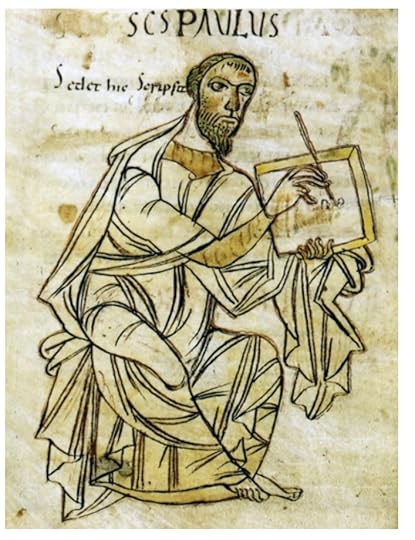 St. Paul writing an epistle in an early 9th century manuscript version of Saint Paul’s letters. The manuscript is said to have been written and illustrated by the scribe Wolfcoz at the Monastery of St. Gallen. The monastery was founded in Switzerland in AD 719.
St. Paul writing an epistle in an early 9th century manuscript version of Saint Paul’s letters. The manuscript is said to have been written and illustrated by the scribe Wolfcoz at the Monastery of St. Gallen. The monastery was founded in Switzerland in AD 719.Do we need a letter of recommendation, as some do, to you or from you? You are our letter, written on our hearts, known and read by all, because you show that you are a letter of Christ, ministered by us, written not with ink but with the Spirit of the living God, not on stone tablets but on tablets that are hearts of flesh. (2 Cor. 3:1-3)
Itinerant preachers needed a letter of recommendation. Wandering prophets who stayed in one place for more than three days were to be rejected. Secular businessmen needed letters of recommendation, as many still do today. St. Paul tells the Corinthian parish that THEY are his letter of recommendation, if anyone needs to know who he is or what he stands for.
Their recommendation is written on his heart, in the very core of his existence. (And in the heart of St. Timothy, his co-worker.) Anyone who knows St. Paul’s heart–anyone who knows him personally–will read the recommendation from the Corinthian church written in his deepest being. St. Paul worked and ministered among the Corinthians and, in return, they wrote him a letter of recommendation.
Evidence of salvation is an epistle itself. The salvation of the Corinthians was in Paul’s heart and in the hearts of those who were with him, for he was always thinking about it….
The things that are promised are eternal and are therefore said to be written with the Spirit of God, unlike temporal things written in ink which fades and loses its power to record anything.
Ambrosiaster, Commentary on Paul’s Epistles (late 4th century)
The letter they wrote was not in ink but “with the Spirit of the living God.” (This is the only place this phrase appears in the Bible.) The spiritual letter they wrote was on St. Paul’s heart, not a tablet of stone–an allusion to the Ten Commandments written on stone by God at Mt. Sinai.
When someone wishes to paint a picture, they first make a sketch with the faint marks of a pencil and outline the proposed figure and insert marks to indicate features to be added later … this preliminary drawing with its faint outline makes the canvas ready to receive the true colors. So it will be with us, if only that faint form and outline is inscribed “on the tablets of our heart” by the pencil of our Lord Jesus Christ …. It is clear, then, that to those who have now in this life a kind of outline of truth and knowledge there shall be added in the future the beauty of the perfect image.
Origen, On First Principles 2.11.4 (second century)
Every priest needs a letter of recommendation if they go to a new diocese. Every bishop needs a letter of recommendation of they go to a new province. The best and most true letter of recommendation that a priest or bishop can have is the parish or diocese they have been serving. The parish is the priest’s letter of recommendation, written on the priest’s heart for anyone to read. The parish–whether in 1st century Corinth or 21st century New York–is the best letter of recommendation a priest or preacher can hope for.
Ink and stone vs. spirit and heart. This contrast or opposition is central to everything that St. Paul ever writes about or says. He stands with Ezekiel and the other prophets who insist that the commandments written on stone are useless if they are not also written in someone’s heart, i.e. the core of a person’s existence.
The post The Pencil of Christ appeared first on Stephen Morris, author.
January 10, 2023
Aroma of Christ
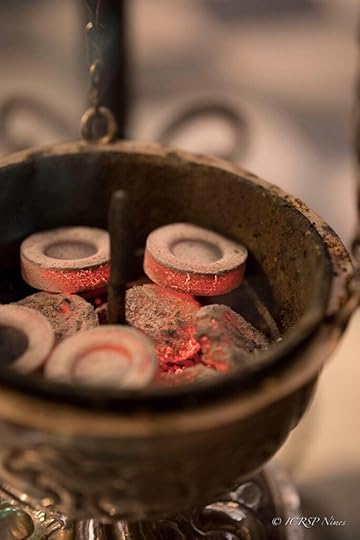
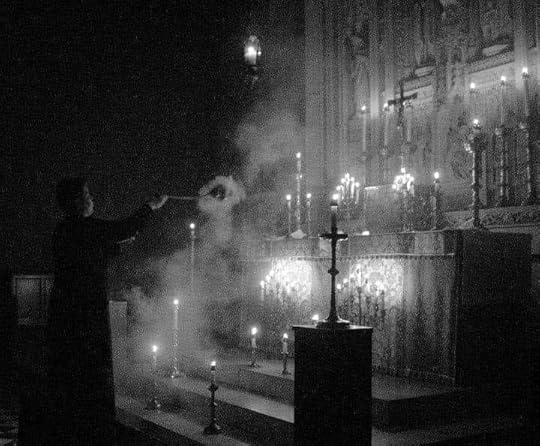
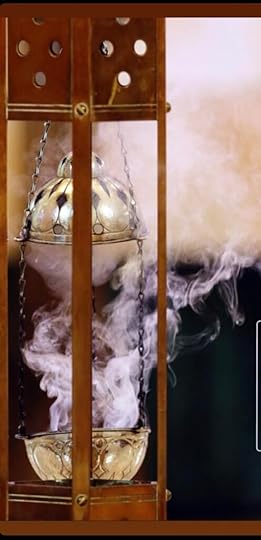
 Charcoal, incense, and thuribles in the worship of God, who descends as the smoke rises.
Charcoal, incense, and thuribles in the worship of God, who descends as the smoke rises.But thanks be to God, who in Christ always celebrates his victory over us by a triumphal procession, and through us manifests the fragrance of the knowledge of him in every place. For we are the aroma of Christ to God among those who are being saved and among those who are perishing, to the latter a fragrance from death to death, to the former a fragrance from life to life. (2 Cor. 2:14-18)
St. Paul says that the Christians are the fragrance, the aroma of Christ in every place. For those who will be saved at the Last Day, the Christians are like the fragrance of incense; for those who will be damned at the Last Day, the Christians are like the stench of a decomposing corpse.
To unbelievers the preaching of the Cross is the smell of death. On hearing the Word of God they receive it as if it were a plague from which death knocks on the door. But to others it is the fragrance of life. To believers the Word of God is a messenger of eternal life.
… Some things are recognized by their smell, even though they are invisible. God, who is invisible, wishes to be understood through Christ. The preaching of Christ reaches our ears just as an aroma reaches our nostrils, bringing God and his only begotten Son right into the midst of his creation. A person who speaks the truth about Christ is … a good aroma from God, worthy of praise from the one who believes. But one who makes erroneous assertions about Christ has a bad smell to believers and unbelievers alike.
(Ambrosiaster, Commentary on St. Paul’s Epistles; written AD 366-384)
Incense, especially frankincense, is commonly found in the Old Testament. Anytime a prophet sees God or the heavenly court, there is a LOT of smoke (i.e. incense) billowing up around the Throne of God. There is a lot of incense filling the air of the Temple–twice a day several shovelfuls of incense are burnt on the altar that stands in front of the Holy of Holies. And on Yom Kippur, the Day of Atonement, the Holy of Holies is itself supposed to be so full of fragrant incense smoke that the High Priest should not be able to see his hand in front of his face.
Put an altar of incense in your innermost heart. Be a sweet aroma of Christ.
… so also the prophetic word is “a sweet fragrance” to those who believe, but to the doubting and unbelieving and those who say they belong to Pharoah, it becomes a detestable odor.
Origen, Homilies on Exodus)
In the New Testament, St. John describes in the Book of Revelation (the Apocalypse) how the angels stand swinging thuribles before the Throne of God and that the heavenly throne room is full of billowing clouds of fragrant smoke as the angels and saints offer the incense and prayers to God. Fragrant incense is everywhere God is, according to the Old and New Testaments.
Then another angel, who had a golden censer, came and stood at the altar. He was given much incense to offer, along with the prayers of all the saints, on the golden altar before the throne. And the smoke of the incense, together with the prayers of the saints, rose up before God from the hand of the angel. Then the angel took the censer, filled it with fire from the altar ….
Book of Revelation 8:3-5
Christians are both the fragrance of Christ in the world and the fragrance of prayer offered to Christ. The Holy Spirit descends as the smoke/prayer rises. Who would not want to experience that scriptural scent as they bow down to God?
The post Aroma of Christ appeared first on Stephen Morris, author.
January 4, 2023
You Forgive=I Forgive=Cheat the Cheater

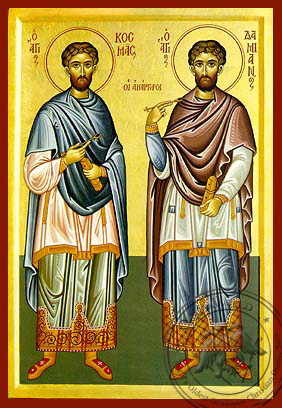 The wonderworking physicians Panteleimon (left) with Cosmos and Damian (right) show the doctors offering their patients medicine on a spoon that looks very similar to a priest offering Holy Communion with a spoon (as in the Orthodox Church). The priest offers healing as a spiritual physician. Physicians offer healing–in Greek, the same word as “salvation”–and the miracles of physical healing-salvation in the Gospel are always about healing-salvation on an even more fundamental level in our lives.
The wonderworking physicians Panteleimon (left) with Cosmos and Damian (right) show the doctors offering their patients medicine on a spoon that looks very similar to a priest offering Holy Communion with a spoon (as in the Orthodox Church). The priest offers healing as a spiritual physician. Physicians offer healing–in Greek, the same word as “salvation”–and the miracles of physical healing-salvation in the Gospel are always about healing-salvation on an even more fundamental level in our lives.Therefore, I beg you to confirm your love for him. For the reason I have written to you is to test you and to know whether you are obedient in everything. The person you forgive, I also forgive. For indeed, what I have forgiven–if I have anything to forgive–I have done for your sake in the presence of Christ, lest we be cheated by Satan; for we are not unaware of his schemes. (2 Cor. 2:8-11)
St. Paul is writing about someone who committed a very serious sin in public and whom the Corinthian parish excommunicated, at his request. (Perhaps it was the man sleeping with his father’s wife.) Now St. Paul is asking the parish to forgive the person. He says that he is testing their obedience, to see if they will forgive at his request as they excommunicated the person at his request. He also promises that if the parish forgives the person, he will also forgive the person. If anyone refuses to forgive, they are being cheated by Satan, the great adversary, whose schemes and plots against the People of God are well known.
The important thing, St. Paul says, is that the parish forgive the sinner. If the parish forgives, then the apostle also forgives. It is the forgiveness of the parish–the entire Church–that cheats Satan of his prey. Forgiveness is always a community event: to be forgiven by one is to be forgiven by all and to be forgiven by all is to be forgiven by one. Forgiveness is never solitary or isolated, done in a corner and unknown.
Confession of sin and forgiveness is always a community act. Although we each confess personally in private to the priest, the priest personifies both Christ and the Church–the Head and the Body together. The priest offers each sinner the forgiveness of both Christ and the Church–the Head and the Body together. If I receive this forgiveness, I cheat Satan of his prey (me); if the priest offers forgiveness on my behalf, we cheat Satan of his prey (the community of the faithful).
Our confession is not about how we sin by “breaking the rules.” Our confession is about telling the spiritual physician–the priest–our symptoms, how the disease of sin afflicts us. The physician doesn’t tell us what we need to do to pay off our punishment for breaking the rules; the priest offers us a prescription of spiritual medicine for how we can recover from the symptoms we have described.
If we ask for-accept-extend forgiveness, we have cheated Satan of his prey. At least for today. Satan deserves to be cheated of his prey because he only snatches his prey because he first cheated us, the human race, by lying and cheating Adam and Eve, our first parents. The cheater is cheated and the world is saved.
The post You Forgive=I Forgive=Cheat the Cheater appeared first on Stephen Morris, author.
December 27, 2022
Christ is born: Glorify him!
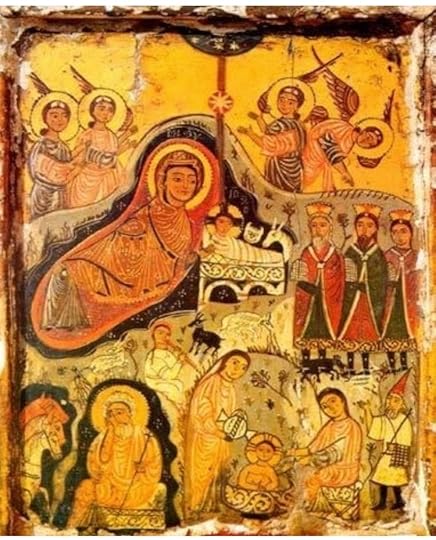 An Egyptian icon of the Nativity of Christ, with the Magi and shepherds above; below, the midwives wash the newborn Christ while the devil, disguised as a shepherd, tempts St. Joseph to doubt God’s promises about the divine Child.
An Egyptian icon of the Nativity of Christ, with the Magi and shepherds above; below, the midwives wash the newborn Christ while the devil, disguised as a shepherd, tempts St. Joseph to doubt God’s promises about the divine Child.Merry Christmas! God bless us, every one.
May he who deigned to be born in a cavern and laid in a manger for us and for our salvation, Christ our true God, through the prayers of his Most Pure Mother, of the holy, glorious, and all-laudable apostles, of the shepherds in the fields, and the Magi from the East: have mercy on us and save us for he is good and loves mankind!


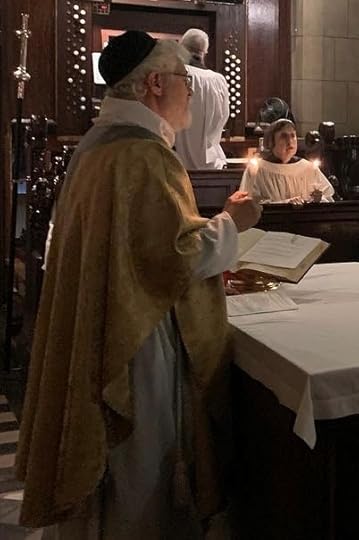

 Scenes from Christmas at the Church of the Good Shepherd in Kips Bay (Manhattan).
Scenes from Christmas at the Church of the Good Shepherd in Kips Bay (Manhattan).The post Christ is born: Glorify him! appeared first on Stephen Morris, author.



